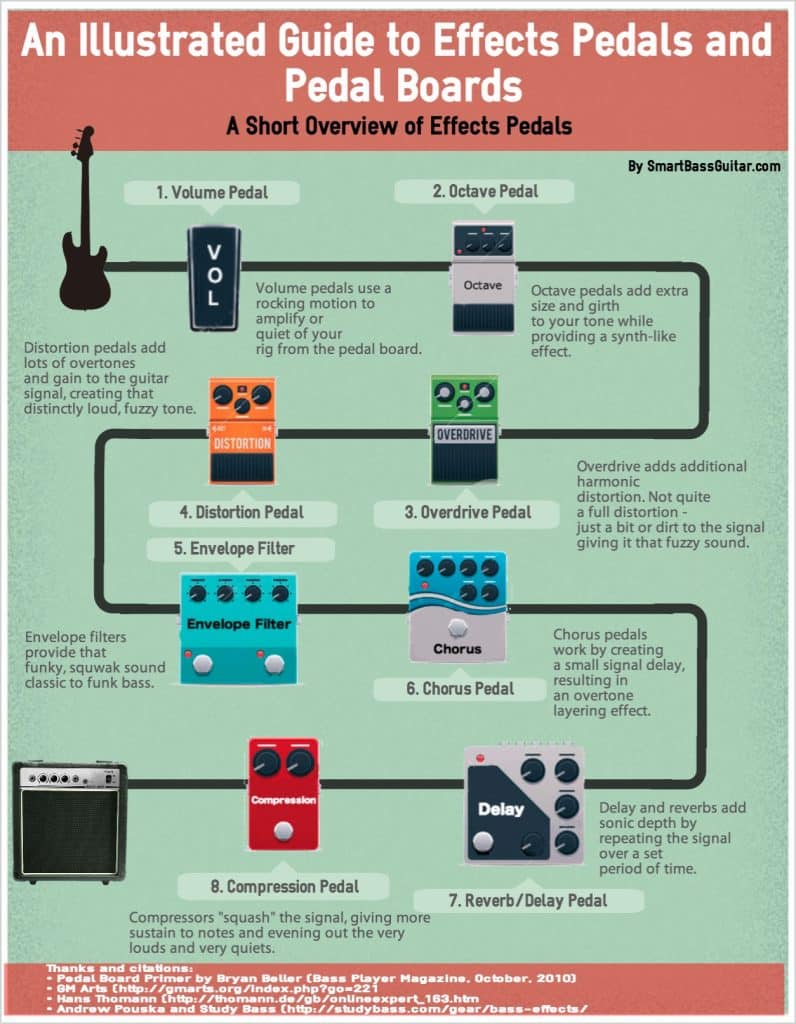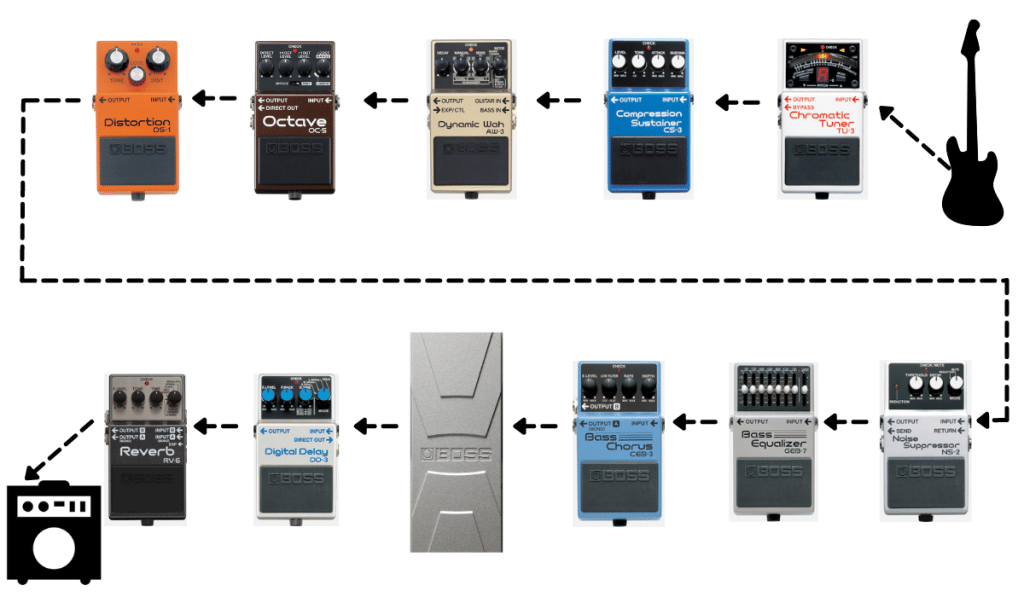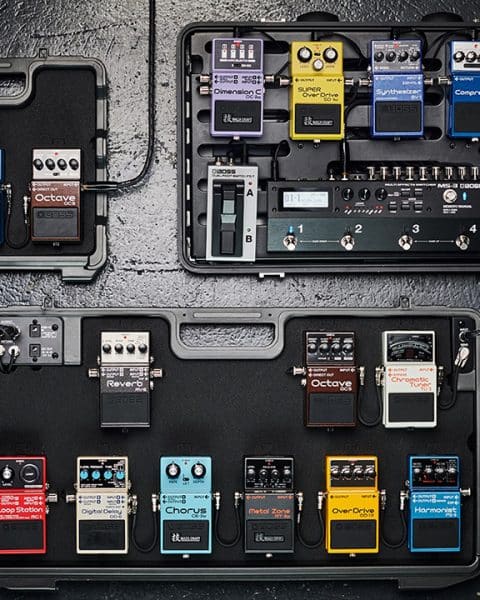Are you a bass guitarist looking for the perfect pedals to enhance your sound? Look no further! In this comprehensive guide, we will take you on a journey through the best bass guitar pedals on the market. From distortion and delay to compression and modulation, we’ll explore the top options for every sound you want to create. Whether you’re a beginner or a seasoned pro, this guide will equip you with the knowledge to make an informed decision when it comes to finding the pedals that best suit your unique style and preferences. Get ready to elevate your bass playing to a whole new level with the ultimate guide to the best bass guitar pedals.

The Ultimate Guide to the Best Bass Guitar Pedals
When it comes to playing the bass guitar, having the right pedals can take your sound to a whole new level. Whether you’re looking to add some distortion, create unique effects, or enhance your overall tone, there is a wide range of bass guitar pedals available to suit your needs. In this guide, we will explore the different types of bass guitar pedals and discuss the factors you should consider before buying one. Additionally, we will highlight some of the best pedals in each category, making your search for the perfect pedal a little easier.
Distortion Pedals
Distortion pedals are an excellent tool for adding grit and aggression to your bass guitar sound. They can help you cut through the mix and stand out in any genre, from rock to metal. If you’re aiming for a heavy, distorted tone that will make your bass guitar growl, a distortion pedal is a must-have.
Some of the best distortion pedals for bass guitar include:
-
Darkglass Electronics Microtubes B7K Ultra: This pedal is known for its versatile tone shaping capabilities and powerful distortion. It allows you to dial in anything from a subtle overdrive to a full-on metal tone.
-
Electro-Harmonix Bass Big Muff Pi: A classic among bassists, this pedal offers a creamy and saturated distortion that is perfect for rock and alternative styles.
-
MXR M84 Bass Fuzz Deluxe: With a wide range of fuzz tones and a built-in gate, this pedal excels at delivering aggressive and punchy bass tones.
-
Pro Co RAT2 Distortion: While primarily designed for guitar, the Pro Co RAT2 Distortion pedal also works exceptionally well with bass guitars. It offers a thick and saturated distortion that is suitable for a wide range of genres.
-
EHX Bass Soul Food Overdrive: This pedal provides a warm and smooth overdrive that adds just the right amount of grit to your bass tone. It’s versatile, easy to use, and sits well in any mix.
Overdrive Pedals
Overdrive pedals are similar to distortion pedals, but they typically offer a more subtle and natural-sounding breakup. They excel at adding warmth and harmonics to your bass tone, making them a great choice if you’re looking for a vintage or bluesy sound.
Here are some of the best overdrive pedals for bass guitar:
-
Tech 21 SansAmp Bass Driver DI: This pedal combines the functionality of an overdrive pedal with a preamp and DI box. It delivers classic tube-like tones and allows you to shape your sound with its comprehensive EQ controls.
-
Fulltone OCD Obsessive Compulsive Drive: Known for its versatility, this pedal can go from a mild overdrive to a hard-hitting distortion. It maintains clarity and dynamics even at higher gain settings, making it a favorite among bassists.
-
Darkglass Electronics Vintage Microtubes: This pedal emulates the sound of a vintage tube amplifier, providing a warm and dynamic overdrive. It’s perfect for adding character and depth to your bass tone.
-
Boss ODB-3 Bass Overdrive: Designed specifically for bass, this pedal offers a wide range of overdrive tones. It includes separate controls for tone, level, and drive, allowing you to shape your sound with precision.
-
MXR M89 Bass Overdrive: With its simple layout and powerful sound, this pedal is perfect for bassists who want a straightforward overdrive. It provides a wide range of tones, from subtle drive to heavy distortion.
Compressor Pedals
Compressor pedals are essential for controlling the dynamics of your bass guitar. They help even out the volume levels and provide sustain, making your playing more consistent and polished. Whether you’re playing live or recording in the studio, a good compressor pedal can make a significant difference to your sound.
Some of the best compressor pedals for bass guitar include:
-
Aguilar TLC Compressor: This pedal offers a transparent compression that helps enhance your tone without sacrificing dynamics. It features a blend control, which allows you to mix the compressed and uncompressed signals for added flexibility.
-
Empress Effects Compressor: Known for its studio-grade quality, this pedal offers a wide range of compression options. It includes controls for attack, release, mix, and output, allowing you to fine-tune your compression settings.
-
MXR M87 Bass Compressor: Designed specifically for bass, this pedal provides a smooth and transparent compression. It features an easy-to-read LED gain-reduction meter, making it easy to monitor your compression levels.
-
Darkglass Electronics Hyper Luminal: This pedal combines a compressor with a powerful enhancer circuit, allowing you to shape your tone with precision. It offers a wide range of compression options and is ideal for both live performances and studio recordings.
Octave Pedals
Octave pedals allow you to add additional notes to your bass guitar sound, creating a thick and subsonic effect. They can replicate the sound of a double bass or create unique textures that add depth to your playing. Octave pedals are popular among bassists in genres like funk, reggae, and progressive rock.
Here are some of the best octave pedals for bass guitar:
-
Electro-Harmonix POG2 Polyphonic Octave Generator: This pedal offers a wide range of octave options, from subtle to extreme. It features separate controls for dry, sub-octave, octave up, and octave down, giving you full control over your sound.
-
EHX Micro POG Polyphonic Octave Generator: With its compact size, this pedal is perfect for bassists who are looking for a pedalboard-friendly option. It provides organic and tracking octave effects and is capable of creating rich and full-bodied tones.
-
MXR M288 Bass Octave Deluxe: This pedal delivers a thick and focused octave sound with excellent tracking. It includes separate controls for both octave levels and a midrange boost, allowing you to fine-tune your sound.
-
TC Electronic Sub ‘N’ Up Mini Octaver: Despite its small size, this pedal offers a wide range of octave effects. It features TonePrint technology that allows you to customize your octaver sound using the TonePrint editor.
-
Boss OC-3 Super Octave: This pedal provides octave effects that can be used both for guitar and bass. It includes three modes: Oct 1, Oct 2, and Drive, offering various octave options and distortion capabilities.
Filter Pedals
Filter pedals are a great way to add movement and texture to your bass guitar sound. They alter the frequencies of your playing, emphasizing or attenuating certain ranges for unique tonal effects. Whether you’re looking to create funky, wah-like sounds or experimental textures, a filter pedal can help you achieve those sonic possibilities.
Some of the best filter pedals for bass guitar include:
-
Source Audio C4 Synth: This pedal is packed with various filter effects, including envelope filters, low pass filters, and phasers. It offers extensive tone-shaping capabilities and allows you to save and recall presets for convenience.
-
MXR M82 Bass Envelope Filter: Designed specifically for bass guitar, this pedal provides a range of funky and expressive filter effects. It includes controls for sensitivity, range, and decay, allowing you to dial in your desired envelope filter sound.
-
Electro-Harmonix BassBalls: This pedal offers dual-filter circuitry for unique and aggressive filter effects. It features controls for distortion, resonance, and a switchable fuzz mode that adds additional grit to your sound.
-
EHX Q-Tron Plus Envelope Filter: Known for its versatility, this pedal offers a wide range of envelope filter effects. It includes a built-in distortion circuit, allowing you to experiment with different tones and textures.
-
Aguilar Filter Twin Dual Envelope Filter: This pedal provides two independent envelope filters that can be used simultaneously or separately. It features a blend control, which allows you to mix the dry and filtered signals for added flexibility.
Delay Pedals
Delay pedals add repeats and echoes to your bass guitar sound, creating a sense of space and depth. They can be used subtly to add a touch of ambience or dialed-in for rhythmic patterns and atmospheric effects. Whether you’re playing melodic lines or creating complex soundscapes, a delay pedal can transform your bass tone.
Here are some of the best delay pedals for bass guitar:
-
Strymon Timeline: This pedal is known for its studio-quality delay effects and extensive features. It offers a wide range of delay types, including tape, analog, digital, and more. It also includes multiple parameters for customization, making it a powerful tool for bassists.
-
Boss DD-500 Digital Delay: With its extensive range of delay sounds and intuitive interface, this pedal offers a versatile and professional-grade delay solution. It includes various modes and onboard editing controls for precise adjustments.
-
TC Electronic Flashback 2 Delay: This pedal offers a variety of delay types, from classic analog to modern digital. It includes the innovative MASH footswitch that allows you to create expressive effects by applying pressure to the footswitch.
-
DigiTech Obscura Altered Delay: Designed specifically for bass, this pedal provides unique and experimental delay effects. It features controls for delay time, repeats, and delay type, allowing you to create anything from tape-like echoes to dark and ambient textures.
-
MXR M169 Carbon Copy Analog Delay: This pedal offers warm and vintage analog delay tones. It includes controls for delay time, mix, and regen, allowing you to shape your delay sound precisely.
Reverb Pedals
Reverb pedals simulate the sound of different acoustic spaces, from small rooms to large concert halls. They can add depth and ambience to your bass guitar sound, making it more immersive and atmospheric. Whether you’re aiming for a subtle touch of reverb or a wash of ethereal tones, a reverb pedal can transform your playing.
Some of the best reverb pedals for bass guitar include:
-
Eventide Space Reverb: This pedal is known for its studio-grade quality and extensive range of reverb effects. It offers shimmering reflections, modulated reverbs, and even blackhole-like sounds. It includes intuitive controls and allows you to save and recall presets for convenience.
-
Strymon BigSky: With its powerful sound quality and wide range of reverb effects, this pedal is highly regarded among bassists. It offers classic reverbs, as well as unique textures and ambient soundscapes. It also includes additional parameters for fine-tuning your reverb sound.
-
Electro-Harmonix Cathedral Stereo Reverb: This pedal provides a variety of lush and ambient reverb sounds. It includes controls for blend, reverb time, and damping, allowing you to create anything from small room sounds to big atmospheric washes.
-
Boss RV-6 Digital Reverb: Known for its simplicity and quality, this pedal offers a range of classic and modern reverb effects. It includes controls for tone, time, and level, allowing you to shape your reverb sound with ease.
-
TC Electronic Hall of Fame 2 Reverb: This pedal offers a wide range of high-quality reverb effects, including plate, spring, and modulated reverbs. It includes a built-in TonePrint technology, allowing you to customize your reverb sound using the TonePrint editor.
Chorus Pedals
Chorus pedals create a thick and shimmering effect by duplicating and slightly detuning your bass guitar signal. They add a sense of depth and movement to your tone, making it sound fuller and richer. Chorus pedals are widely used in genres like funk, pop, and progressive rock.
Here are some of the best chorus pedals for bass guitar:
-
MXR M83 Bass Chorus Deluxe: Designed specifically for bass, this pedal provides a wide range of chorus effects. It includes separate controls for bass and treble, allowing you to shape your chorus sound with precision.
-
Electro-Harmonix Bass Clone Chorus: Known for its warm and lush chorus sound, this pedal is perfect for bassists who want to add a touch of vintage flavor to their tone. It features controls for depth, rate, and a switchable filter matrix mode for added versatility.
-
TC Electronic Corona Chorus: This pedal offers a range of classic and modern chorus sounds. It includes controls for speed, depth, and toneprint, allowing you to customize your chorus sound using the TonePrint editor.
-
Boss CEB-3 Bass Chorus: Designed specifically for bass guitar, this pedal provides a range of smooth and musical chorus sounds. It includes controls for depth, rate, and low filter, allowing you to tailor your chorus effect to your liking.
-
EHX Small Clone Chorus Nano: Despite its small size, this pedal offers a lush and rich chorus effect. It features a single rate control and a switch for toggling between chorus and vibrato modes.
Flanger Pedals
Flanger pedals create a sweeping and jet-like sound by combining two identical signals with a slight delay. They add a sense of movement and intensity to your bass guitar sound, making it stand out in any mix. Flanger pedals are commonly used in genres like rock, metal, and psychedelic music.
Some of the best flanger pedals for bass guitar include:
-
MXR M117R Flanger: This pedal is known for its versatile sound and rugged build quality. It offers a wide range of flanger effects, from subtle to extreme. It includes controls for speed, width, and regeneration, allowing you to dial in your desired flanger sound.
-
Electro-Harmonix Electric Mistress Flanger/Filter Matrix: This pedal provides a range of lush and swirling flanger effects. It features controls for rate, range, and color, allowing you to shape your flanger sound with ease.
-
Aguilar Grape Phaser Bass Phase Pedal: Despite its name, this pedal offers both flanger and phaser effects. It is specifically designed for bass and provides a range of deep and swirling flanger tones. It features controls for blend, speed, and regeneration.
-
Chase Bliss Audio Wombtone mkII Phaser: This pedal offers a unique and highly customizable flanger and phaser sound. It includes controls for modulation, mix, and shape, allowing you to create everything from subtle flanging to complex and dynamic phasing.
-
Boss BF-3 Flanger: Known for its simplicity and quality, this pedal provides a range of classic flanger effects. It includes controls for depth, rate, and mode, allowing you to shape your flanger sound with ease.
Phaser Pedals
Phaser pedals alter the phase of your bass guitar signal, creating a swirling and spacey sound. They add movement and texture to your tone, making it more dynamic and interesting. Phaser pedals are widely used in genres like funk, rock, and progressive music.
Here are some of the best phaser pedals for bass guitar:
-
MXR Phase 90 Phaser: This pedal is known for its classic and iconic phaser sound. It provides a smooth and warm modulation that is perfect for adding a touch of vintage flavor to your bass tone.
-
EHX Small Stone Phaser Nano: With its compact size and classic sound, this pedal is a favorite among bassists. It offers a range of warm and swirling phaser effects, from subtle to extreme.
-
Aguilar Grape Phaser Bass Phase Pedal: Designed specifically for bass, this pedal provides a range of deep and rich phaser tones. It features controls for blend, rate, and color, allowing you to shape your phaser sound with ease.
-
Chase Bliss Audio Wombtone mkII Phaser: This pedal offers a unique and highly customizable phaser sound. It includes controls for modulation, mix, and shape, allowing you to create everything from subtle phasing to complex and dynamic modulation.
-
Boss PH-3 Phase Shifter: Known for its versatility, this pedal offers a wide range of phaser effects. It includes controls for rate, depth, resonance, and stage, allowing you to dial in your desired phaser sound with precision.

Factors to Consider Before Buying a Bass Guitar Pedal
Now that you have explored the different types of bass guitar pedals and some of the best options in each category, it is essential to consider certain factors before making a purchase. These factors will help you ensure that the pedal you choose matches your playing style, budget, and overall requirements.
Budget
The first factor to consider when buying a bass guitar pedal is your budget. Pedals can range in price from affordable options to high-end boutique models. It’s important to determine how much you are willing to spend on a pedal before you start your search. Remember that investing in a quality pedal can significantly enhance your sound, but there are also budget-friendly options available that can still deliver excellent results.
Effect Type
Once you have determined your budget, it’s important to consider the type of effect you want to add to your bass guitar sound. Do you want to add distortion, overdrive, compression, octave, filter, delay, reverb, chorus, flanger, or phaser effects? Each effect has its own unique characteristics, so it’s essential to choose one that suits your playing style and musical preferences.
Build Quality
Another crucial factor to consider is the build quality of the pedal. Bass guitar pedals can take a beating, whether you’re gigging regularly or simply practicing at home. Look for pedals that are built with durable materials and have sturdy switches and knobs. It’s also worth considering if the pedal has the option for battery power or if it requires an external power supply.
Versatility
Versatility is an essential factor to consider, especially if you play a wide range of musical genres. Some pedals offer a single effect, while others provide multiple effects or additional features. Consider if you want a pedal that can offer different sounds or if you prefer a dedicated effect that excels in a specific area.
Controls
The controls of a bass guitar pedal can greatly impact how you shape your sound. Consider if the pedal has the necessary controls to fine-tune the effect to your liking. Look for pedals with intuitive and easy-to-use controls that allow for precise adjustments. Some pedals may also include additional features like EQ controls or built-in presets, which can enhance your overall playing experience.
Power Supply
It’s important to consider how the pedal is powered. Some pedals require a dedicated power supply, while others can be powered by batteries or through USB. Consider your setup and whether you have enough power outlets or if you prefer the convenience of using batteries.
Size and Portability
The size and portability of a pedal can be a crucial factor, especially if you plan to use it on a pedalboard or if you travel frequently. Consider the size and weight of the pedal and how it will fit into your setup. Compact and lightweight pedals are generally more portable and can be easier to integrate into your rig.
Pedalboard Compatibility
If you plan to use the pedal on a pedalboard, it’s important to consider its compatibility. Some pedals may have unconventional shapes or require additional cables or adapters. Make sure the pedal fits well on your pedalboard and can be easily integrated into your signal chain.
User Reviews
One of the best ways to gauge the quality and performance of a bass guitar pedal is to read user reviews. Check out what other bassists have to say about the pedal you are interested in. Look for reviews that focus on sound quality, durability, ease of use, and overall value for money. User reviews can provide valuable insights and help you make an informed decision.
Brand Reputation
Lastly, it’s worth considering the reputation of the brand behind the pedal. Some brands are well-known for their high-quality and reliable pedals, while others may offer more budget-friendly options. Research the brand’s history, customer feedback, and reviews to assess their overall reputation and the quality of their products.
By considering these factors, you can ensure that the bass guitar pedal you choose meets your requirements and enhances your playing experience. Remember that the best pedal for you will ultimately depend on your personal preferences, playing style, and musical goals.
In conclusion, the world of bass guitar pedals offers a wide range of options to enhance your playing experience. Whether you’re looking to add distortion, create unique effects, or shape your tone, there is a pedal out there that suits your needs. By understanding the different types of pedals, considering the factors mentioned above, and exploring some of the top options in each category, you can find the best bass guitar pedal for your musical journey. Happy playing!







